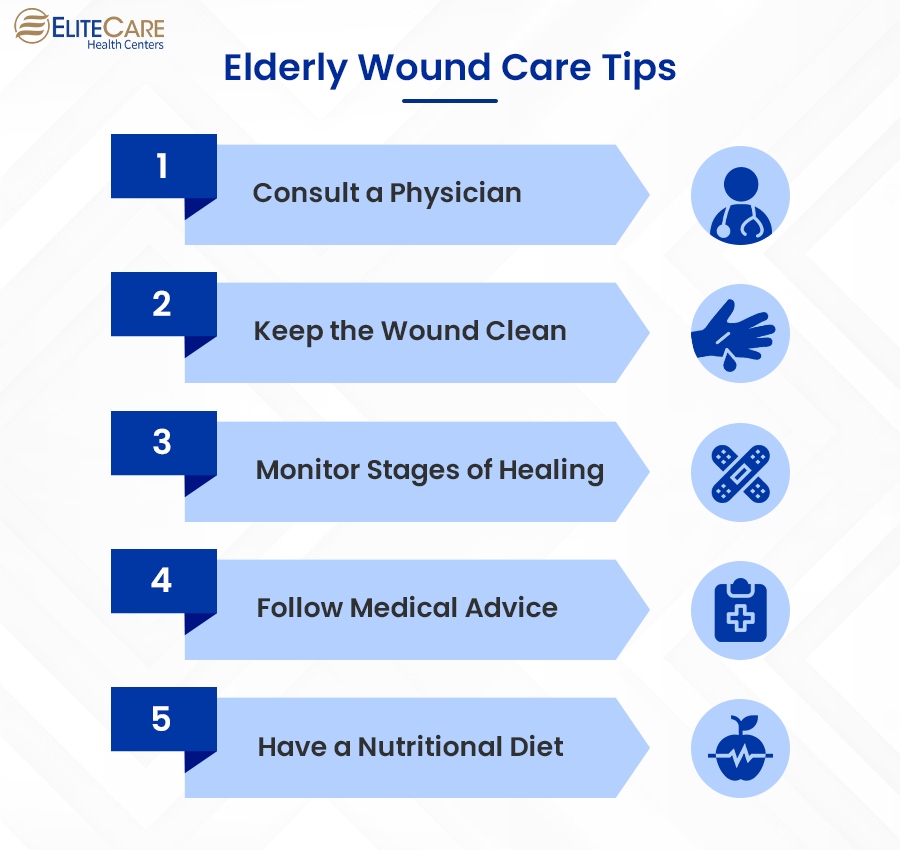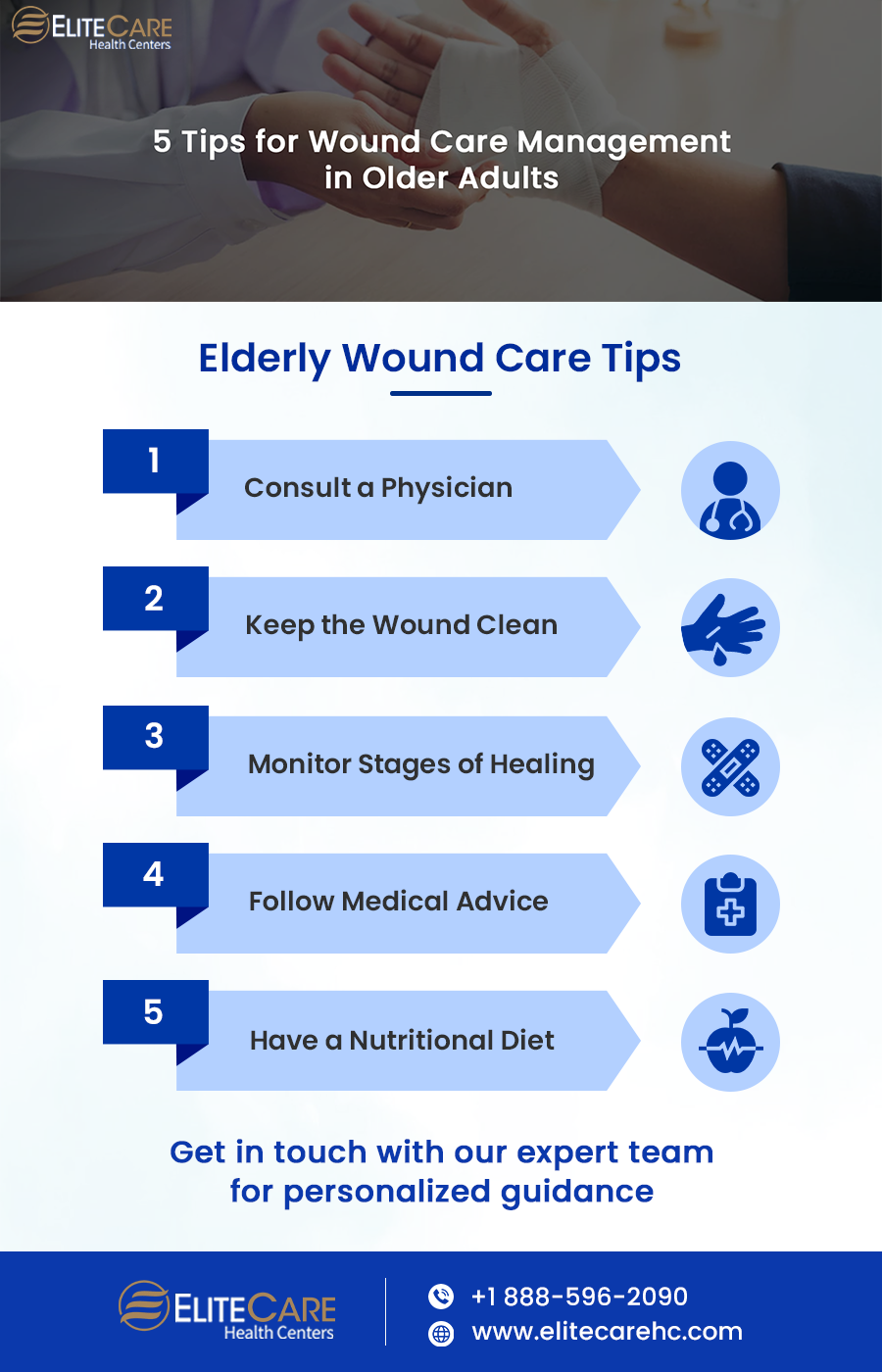
In elderly people, the risk of wounds increases as a result of thinning skin, weak bones, and sagging muscles. This condition of the skin slows down its ability to heal from wounds quickly. This explains why an older person’s skin heals more slowly from wounds than that of a 5-year-old, who can scrape their knee and have no signs of injury after a week. Aging slows down the function of specialized immune cells to fight disease causing microbes, and the risk of serious skin infection rises. This slow rate of cell division also results in slow skin regrowth.
Thus, it becomes crucial to treat wounds in older people before they get infected, especially for patients who are susceptible to conditions like diabetes or other chronic diseases.
Read on to learn about wound care & its importance in elderly people.
What Is Wound Care?
Wound care and treatment in older people are essential steps to avoid serious complications and infections such as cellulitis or sepsis. However, the wound care methods differ for acute and chronic wounds.
Acute wounds include surgical, traumatic, and burn injuries that are a result of a cut in the skin.
Their treatment depends upon the severity of the wound. While minor wounds can be treated with cleansing, antiseptic, and bandaging, major ones may even need stitches to close the wound.
Contrary to this, chronic wounds are those that take a long time to heal. These wounds frequently spend too much time in the inflammatory stage. There are many different kinds of chronic wounds, including venous and arterial ulcers, diabetic ulcers, and pressure ulcers.
Managing these wounds requires regular wound cleaning and dressing by primary care physicians. In certain situations, specialized treatments like vacuum-assisted closure or skin grafts are also performed.
Importance of Wound Care for Seniors
As per recent research by the National Council on Aging in the United States, about 80% of these older adults have one chronic condition, and about 68% have at least two. They also suffer from poor blood circulation, inactivity, poor nutrition, or a weak immune system. So, you need to make sure that any wounds your elder loved one gets are treated carefully.
Here are the top 5 wound care tips for seniors to increase the chances of having a successful wound healing.
Elderly Wound Care Tips: 5 Best Practices

Consult a Physician
The first few days after an injury require good wound care, as minor cuts and wounds probably heal within a week.
But one should seek medical attention right away if their cut or wound is deeper or not healing properly. Recovery from such injuries is crucial for the elderly to prevent chronic illness.
Keep the Wound Clean
Clean the affected area with antiseptic and disinfectant cleanser twice a day or as prescribed by the physician. Do cover the wound with sterile dressing pad only, since they can be removed with minimal distress to the aging skin.
Monitor Different Stages of Healing
As a wound heals, an injured person typically experiences itching and peeling of the skin around the wound. Because the skin of the elderly is significantly drier, the itching might even become a challenge.
Therefore, it’s necessary to discuss all the challenges experienced while healing with the doctors. It will aid in avoiding the possibility of the wound getting infected or even worse.
Follow Medical Advice
- Different medical treatments are prescribed by primary care physicians to heal the different types of wounds.
- These treatments are based on the patient’s pre-existing medical issues. To treat the wound and prevent any infections brought on by the damage, healthcare providers occasionally change or prescribe different medications.
- Therefore, even if the injury and its accompanying symptoms heal, one must closely adhere to all medical instructions and measures in order to recover quickly from minor and significant injuries.
Nutritional Requirements to Promote Fast Wound Healing
Any excessive blood loss, swelling, and pain caused by an acute or chronic wound may require additional nutritional (dietary) requirements to heal. Healing from such wounds requires monitoring the patient’s dietary pattern, especially those of older individuals.
Healthy food choices encourage healing by supplying the adequate number of calories, vitamins, minerals, and protein necessary to promote recovery.
A nutritional diet may include:
- Whole grains can help provide the essential amino acids required for tissue repair and collagen synthesis.
- Fruit and vegetable smoothies with vitamin C for an energy boost
- Vitamin A for cell growth and the formation of new blood vessels, which are vital for wound healing.
- Dairy products like milk or yogurt to supplement the calcium deficiency
- Water & unsweetened beverages to stay hydrated
Provide easy-to-chew & digest meals to seniors to balance their body’s nutritional requirements.
Need A Specialist?
If you are looking for a primary care physician, we can assist you. EliteCare Health Centers is a medical clinic in Florida offering a range of senior care services, including primary health care, wellness care, and dental care for older adults under one roof. Our qualified and compassionate team of primary care physicians provides personalized health care, customized for all your unique requirements.
We have our centers in multiple locations in Florida. Our primary health care clinics are present in Spring Hill, Homosassa, Tarpon Springs, Port Richey, and Sebastian in Florida. Call us at +1 888-596-2090 to schedule an appointment at the center nearest you!





